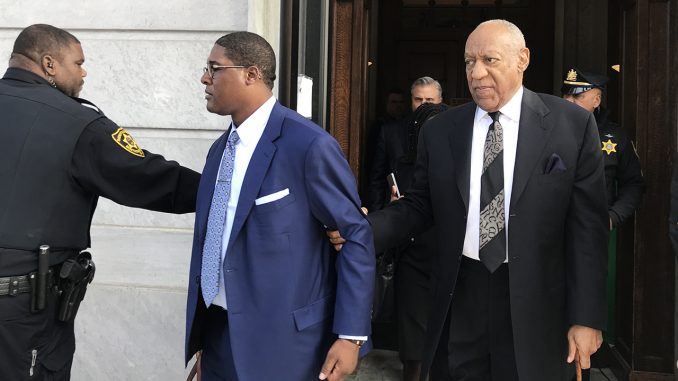
NORRISTOWN, Pa. — Who is the con artist?
The jury in Bill Cosby’s sexual assault retrial is now tasked to determine, after hearing closing arguments from both the Montgomery County District Attorney’s Office and Cosby’s defense team, if Cosby or former Temple emloyee Andrea Constand is a “con artist.”
The word “con” was used by both teams. The defense described Constand as a “pathological liar” who perpetrated the “biggest highway robbery of all time” for her settlement of nearly $3.4 million in a 2005 civil suit, Cosby’s attorney Tom Mesereau told the court. But the prosecution claimed Cosby conned his way to sexually assaulting women for decades through a “signature plan” of mentorship then betrayal, Assistant District Attorney Kristin Feden said as she marched over to where Cosby was seated in the courtroom.
But most importantly, the jury will soon decide — beyond a reasonable doubt — whether Cosby drugged and sexually assaulted Constand in his Montgomery County home in January 2004.
Closing arguments filled the day Tuesday, with two attorneys tag-teaming each statement on the 12th day of Cosby’s retrial for three counts of indecent aggravated assault. Cosby is being tried in the Montgomery County Courthouse for allegedly drugging and sexually assaulting Constand in January 2004.
The defense gave its closing argument with a two-hour attack on Constand’s credibility. Kathleen Bliss, one of Cosby’s defense attorneys, was the leadoff hitter on the argument. She used her time to bolster the testimony by the defense’s key witness Marguerite Jackson, a Boyer College of Music and Dance academic adviser who said Constand told her on a trip with the women’s basketball team that she could accuse a celebrity of sexual assault to “get that money.”
“Ms. Jackson has no stake in this case,” Bliss told the court. “She owes no one anything.”
But during the prosecution’s three-hour closing statement, Assistant District Attorney M. Stewart Ryan criticized the defense for sitting down with Jackson and altering her statement before she took the stand last week. He also alleged she may have benefitted from taking the stand.
“Two months later…she was starting her music promotions business,” Ryan said. “I bet that was really hard for her.”
Bliss used the rest of her time to attack the five accusers who took the stand to testify in the case for their “morality” for sleeping with a married man and likened their accusations to “witch hunts, lynching and McCarthyism.”
The defense’s closing testimony was then passed on to Mesereau, who detailed 12 of Constand’s “dead bang lies,” including inconsistencies around her prior sexual contact with Cosby, her flirting with Cosby and how long she had known Cosby when she reported to the police.
Mesereau then challenged the prosecution to prove that the assault occurred after Dec. 30, 2003 for it to be a valid case. Under Pennsylvania’s statute of limitations, a case must be submitted within 12 years. Cosby was arrested on Dec. 30, 2015.
Mesereau used the Temple women’s basketball schedule and Cosby’s travel schedules between Dec. 30, 2003 and Jan. 31, 2004 to argue that the alleged assault could not have occurred at that time. He also discussed 202 phone calls between Constand and Cosby between 2002 and 2005, 147 of which were by Constand and 55 by Cosby.
A few days in particular — Jan. 7 and March 16 — were noted by the prosecution as days when Cosby was in Philadelphia and the alleged assault could have occurred. The prosecution is not legally required to prove the date of the assault, but rather that it occurred within the statute of limitations.
“The man is innocent,” Mesereau pleaded to the jury. “He’s never had a guilty conviction in his life.”
Both teams split up topics quite similarly: Bliss and Fedentook on credibility — or the lack thereof — of Constand and the five accusers who testified, while Mesereau and Ryan took on the statute of limitations and phone calls between Constand and Cosby.
Camille, Cosby’s wife of more than 50 years, attended the trial for the first time for closing statements Tuesday. Constand attended the prosecution’s closing.
Feden’s part of the closing argument was fiery — filled with charges of “character assassinations” by the defense and how each of the accusers, including Constand, falls in line with the characterization from expert witness and professor at the Lewis Katz School of Medicine Dr. Barbara Ziv about survivors of sexual assault.
“Bill Cosby, who was able to capture the nation as a whole in that role he played, he was able to transcend race, transcend culture, transcend gender,” Feden said. “But he is nothing like the American dad. He is nothing like the image he plays on TV. He used that image to gain the trust of young, aspiring, unsuspecting women so he could sexually assault and strip them…of their ability to say ‘no.’”
“He preyed on Andrea Constand the same way he preyed on all five women,” she added.
The jurors will receive legal instructions from O’Neill on Wednesday morning before beginning deliberations.



Be the first to comment